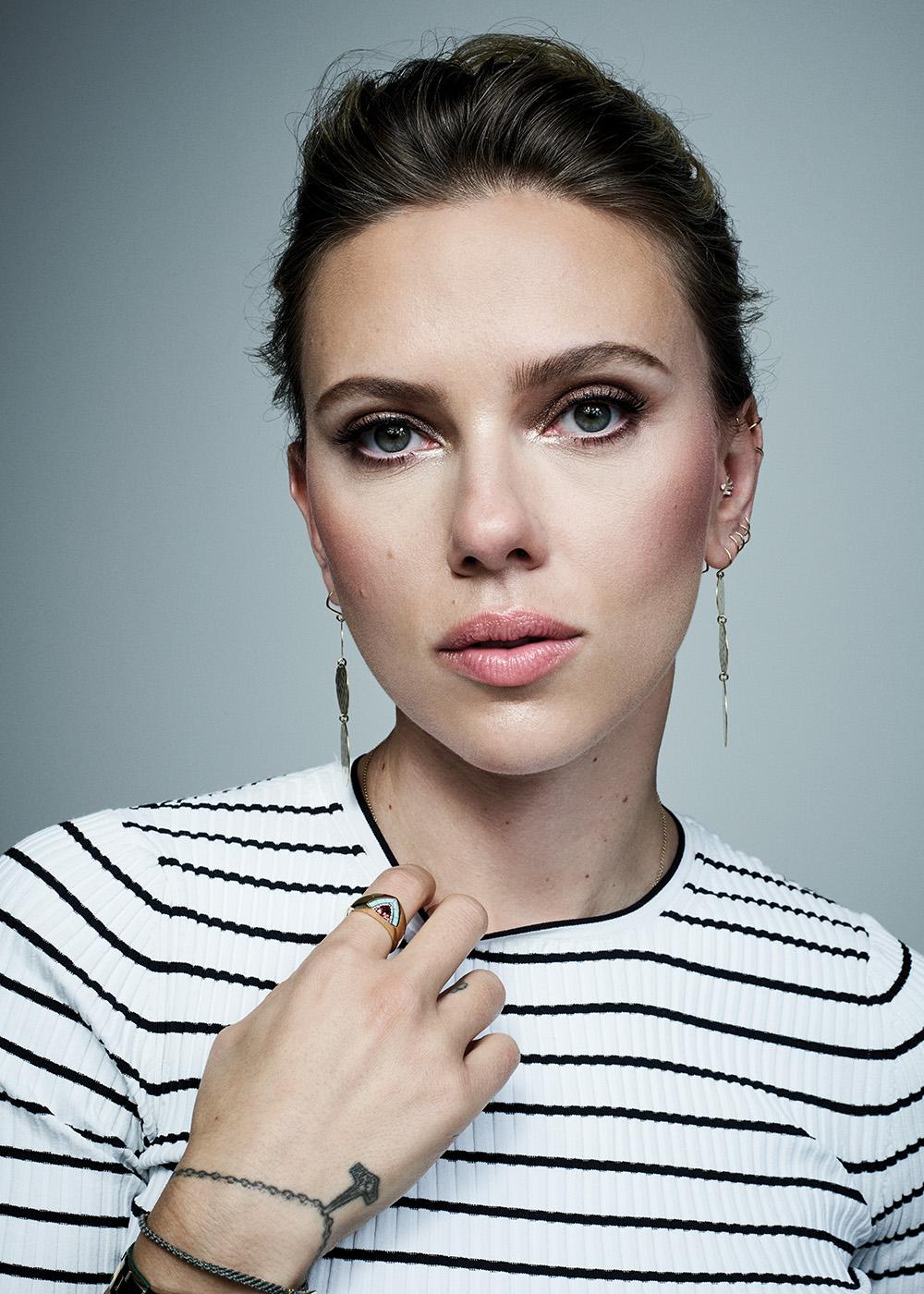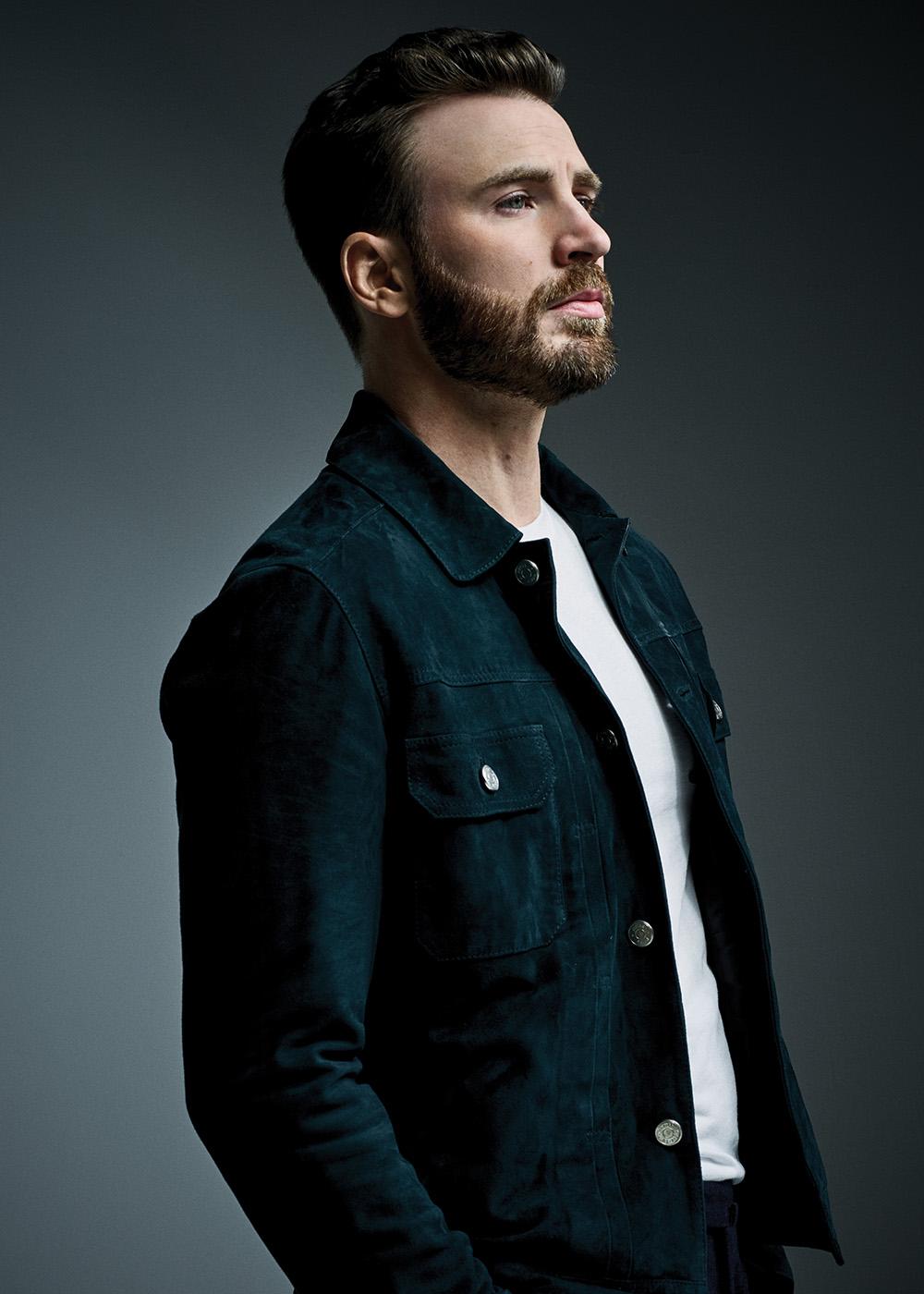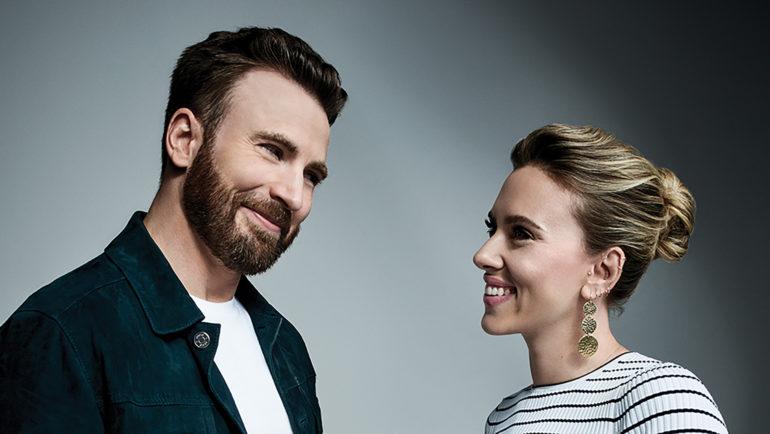Chris Evans and Scarlett Johansson on Marvel, ‘Marriage Story’ and ‘Knives Out’
By Ramin Setoodeh
LOS ANGELES (Variety.com) – Chris Evans and Scarlett Johansson sat down for a chat for “Variety Studio: Actors on Actors
.” For more, pick up the Actors on Actors issue on Nov. 12, tune into PBS SoCal on Jan. 2 or stay tuned right here at Variety.com.
When first sees at our photo shoot, she lets out a shriek of joy. It’s as if she’s spotted a long-lost relative, and, in a way, she has — Johansson and Evans first met in their late teens on the comedy “The Perfect Score,” played a romantic duet in “The Nanny Diaries” and went on to land lead roles in the Marvel Cinematic Universe, which reached a crescendo this past spring with “Avengers: Endgame.” This winter, both successfully pivot away from superheroics: Johansson plays an actor suffering through a difficult divorce in Noah Baumbach’s “Marriage Story,” and a mother in Holocaust Germany in Taika Waititi’s satirical “Jojo Rabbit.” Evans, far from the virtuous Captain America, is the snobbish grandson of a famous novelist in Rian Johnson’s tantalizing murder mystery “Knives Out.”
Chris Evans: I just did see “,” and it’s phenomenal. I’ll be shocked if you’re not showered with awards, but what made you want to tell that story? It’s heavy. It’s dark.
Scarlett Johansson: Probably 10 years ago, Noah and I tried to work on something else together. We kind of developed for a little bit, and then it didn’t end up being right, and by the time it was ready to shoot, I was kind of past it. It wasn’t the right fit.
I’m sure you’ve probably had that experience before, where you feel like maybe something didn’t work out professionally and you’re like: “Well, there goes that relationship.” That’s never happened to you?
Evans: No.
Johansson: Yeah, right. I was so surprised when he called me years later to meet and talk about something. It totally came out of the blue. I met with him in New York, and it was like no time had passed at all. We kind of shifted right into this moment where he pitched me this story a little bit, and I myself was actually in the middle of going through a divorce. It was such a strange coincidence.
Evans: How much of the script was on the page already prior to signing on?
Johansson: It was nothing. It was just a concept.
Evans: Wow! Did you have input? Because one of the things that is so tragic about it is that, when you think of a divorce story, you imagine much more about contentious, prickly, almost enemies. But a lot of the movie, there’s two people trying to make it work.
Johansson: When I received the script, we’d spoken so much about our relationships — and what it was like to be single parents, and our families — and all of that stuff kind of made it in there. It’s complicated, right?
Evans: It’s heartbreaking.
Johansson: I know even when we were doing all of the “Endgame” and “Infinity War” stuff, you were prepping for “” already.
Evans: Yeah. We were doing the reshoots for those last couple of bits. I don’t know if you were there. You were so in and out, because you died. If you haven’t seen it —
Johansson: Maybe too bad! I was talking to Noah while we were doing “Infinity War” and “Endgame” stuff. It was something for me to hold on to during those often tedious days of whatever. All that action storytelling that we have to do where you have to be in it for these little segments of time.
Evans: There’s a lot of things about those movies where it’s not just the actual filmmaking process. It’s very start, stop, start, stop with little bits and pieces of the action. Plus, it’s roles that we’ve played for a really long time, really familiar. No disrespect to those movies — I love those movies — but to come off of them and have a completely different approach to find a character, to collaborating with other artists, it’s just unchartered waters coming off a Marvel movie. It’s just exciting to get a change of pace.
Johansson: How does it work with Rian?
Evans: He’s wonderful. He knows what he wants. I love the idea of writer-director combos, because when a bunch of people read one piece of material, we all have a subjective opinion on what to interpret. When you have a writer-director, they can say: “No, this is exactly what I meant.” Rian is very task attuned. Two takes and you’re done.
Johansson: Really?
Evans: Which, as an actor, you’re terrified, because if you give me 50 takes, I’ll take them.
Johansson: How come you don’t ask for more?
Evans: It takes me a couple of days to get comfortable on set to do that. Because if you ask for more, and they don’t get better, it’s going to be harder to ask for more in the future.
Johansson: That’s a funny way of looking at it.
Evans: Yeah. It’s a really insecure, egoic way of looking at it.
Johansson: I feel if you have an idea for something, and this is probably good advice for actors that are kind of coming up or starting out in film, you should ask for another take. Or you feel maybe you have something else in you that you’re curious about, you should ask for another take because it will haunt you forever.
Evans: Sure.
Johansson: Noah is in stark contrast to Rian. He’s relentless, and you can do 50 takes. He only uses one camera, and he’s very specific about the words are the words. Every hesitation, every unfinished sentence, everyone talking over one another is all completely scripted.
Evans: Nothing is improvised in that movie?
Johansson: Not a single word.
Evans: You guys both need Oscars, because I was like, “Oh, this is improvised.” It’s like theater.
Johansson: It totally was like theater. I wanted to ask you about your experience in theater too, because you’re so good.
Evans: It’s like you’re my only actor friend that actually came to see the play [2018’s Broadway revival of “Lobby Hero”].
Johansson: They paid me.
Evans: Yup.
Johansson: Were you nervous before you did it?
Evans: Terrified. After a while, the process of filmmaking does get stale. You just want to try and find a new way into what has become very familiar. I think what I was hunting for was that prolonged period of time within a scene, thinking it would allow this liberation. It couldn’t have been more to the contrary. When you’re onstage it’s just like, “Man!” — because you have so much to remember.
Johansson: I didn’t feel that way watching you though.
Evans: Original content, it’s not there very often. That is one of the best things about “Knives Out.” It was something that I read that felt fresh and new. I think this weird chicken-and-the-egg thing, who started it? Did audiences only start going to lowbrow stuff, so that’s what we started making? Or is it that we made it first, and now that’s all we’re offered?
Johansson: Hey, speak for yourself. It’s interesting, because a couple of people in the past couple of days have mentioned to me that a couple of extremely esteemed directors have been really vocal about how the whole Marvel universe and big blockbusters are really, like, “despicable” and “the death of cinema.” At first I thought that seems kind of old-fashioned, and somebody had to explain to me, because it seemed so disappointing and sad in a way. They said, “I think what these people are saying is that at the actual theater, there’s not a lot of room for different kinds of movies, or smaller movies, because the theater is taken up by huge blockbusters.”
It made me think about how people consume content now, and how there’s been this huge sea change with their viewing experience.
Evans: I think original content inspires creative content. I think new stuff is what keeps the creative wheel rolling. I just believe there’s room at the table for all of it. It’s like saying a certain type of music isn’t music. Who are you to say that?
Johansson: What are you looking for now?
Evans: Every couple of months, I decide I’m done acting. This has been my thing for decades now. I’m always looking for a way out, but I do love it. I think TV right now, those creative minds are given a bit more freedom. It feels like movies sometimes get inundated with studio notes, and all of a sudden, what was once an original idea becomes boiled down to the lowest common denominator, and then you have no one’s favorite movie but everyone’s lukewarm movie. I think that’s why people may be turning away, and looking to things like streaming service shows that actually are innovative.
Johansson: When I read the script for “Jojo Rabbit,” I had never seen anything like it before. But that film found its way through Fox Searchlight. That studio doesn’t shy away from stuff that’s subversive, and they’re happy to give it a theatrical release. There’s room for independent film for sure. I think people want diversity. They want to see different things.
What I’m actually curious about: You’re kind of looking at it as a director, if there’s something that continues to interest you? Where is your head with that stuff?
Evans: I’m trying to direct, but I don’t have the courage or focus to write. The hardest thing is finding material. The good material isn’t just sitting there untouched. It’s tough to find. When I directed, one of the tricky things was, I found some little broken-bird script, and I thought, “Oh, I can nurse this thing back to health.” In retrospect, I do think even the best version of the movie I directed, there may have been a ceiling based on the material. If it’s not on the page, I may have been — I don’t want to say naive — hopeful that we could elevate it beyond what the potential seemed to be.
You know what I’m curious about? Scarlett, what was it like meeting for the first time? What’s it been like working with me? Be nice.
Johansson: I’m trying to remember. It must have been on the set of “The Perfect Score” at some point in our rehearsal. We had a very at the time in-the-moment teen comedy, that actually now is somehow maybe relevant — about an SAT scandal.
Evans: It was almost 20 years ago.
Johansson: Yeah, it feels like a long time ago. We were just children then.
Evans: I think we all went out one night, and you couldn’t get in the club.
Johansson: Because I was 17. Yup, those were the days. You’ve always been such a great actor. You were great then, and so incredibly photogenic, and you just came alive on screen in a way that’s very uncommon. It was so nice to work with you, because I felt we had great chemistry as actors, and there was a naturalistic approach that I felt. Then we also got to work together on “The Nanny Diaries.”
Evans: Having “Avengers” be the biggest movie of all time —
Johansson: Is it the biggest movie of all time? Wow. We really do need to go on vacation.
Evans: We’ve been trying to organize this “Avengers” vacation. We deserve a little victory lap. It’s not just wonderful because you get to be a part of a pop culture phenomenon, the same way “Star Wars” impacted me. But I think what really will stay with me is the fact that the people we got to work with, truly there is not a bad apple in the bunch.
Johansson: It’s funny, because I remember back in “Iron Man 2” days, I think you had just finished filming the first “Cap.” It was so interesting that you and I were coming together again. We had no idea what we were making. It was just impossible to know what a phenomenon the Marvel Cinematic Universe or “The Avengers” would be. You jump at the chance, but having been through it myself with a partner that I was with, who also had another big iconic superhero thing he was working on, it’s the pressure. You don’t know how it’s going to go, right? It seems ridiculous now, but it could be career-ending.
Evans: Yeah. I feel unbelievably lucky to have been a part of something like that. It will be one of my treasured memories of life. Even when we went on to do “Avengers,” the first one, I think everybody was feeling very uneasy about the concept. It was just so absurd. It was a big endeavor. If this doesn’t work, the pipe dream that we’ve been hearing about could derail very quickly.
Johansson: Were you shocked by how well the first “Avengers” did?
Evans: After that, I knew there was a chance this could be something big.
Johansson: Would you come back?
Evans: To Marvel? Wow. Everything clicks when I get up. Recovery is not the same. You never say never. I love the character. I don’t know.
Johansson: Not a hard no.
Evans: It’s not a hard no, but it’s not an eager yes either. There are other things that I’m working on right now. I think Cap had such a tricky act to stick the landing, and I think they did a really nice job letting him complete his journey. If you’re going to revisit it, it can’t be a cash grab. It can’t be just because the audience wants to be excited. What are we revealing? What are we adding to the story? A lot of things would have to come together.
Johansson: It’s not obvious.
Evans: It doesn’t feel, at this time, that would be a thing.
Johansson: I wasn’t there for the last third of the film or whatever. I actually had no idea what was going to happen. I don’t know how it worked, exactly, if it was scripted. It was such a beautiful cathartic ending, and I loved that for Steve. I think he deserved that. It was all his happiness.
Evans: It’d be a shame to sour that. I’m very protective of it. It was such a precious time, and jumping onto the movie was a terrifying prospect to me. I said no a bunch of times, and there’s a million and one ways it could have gone wrong. It almost feels like maybe we should let this one sit.



